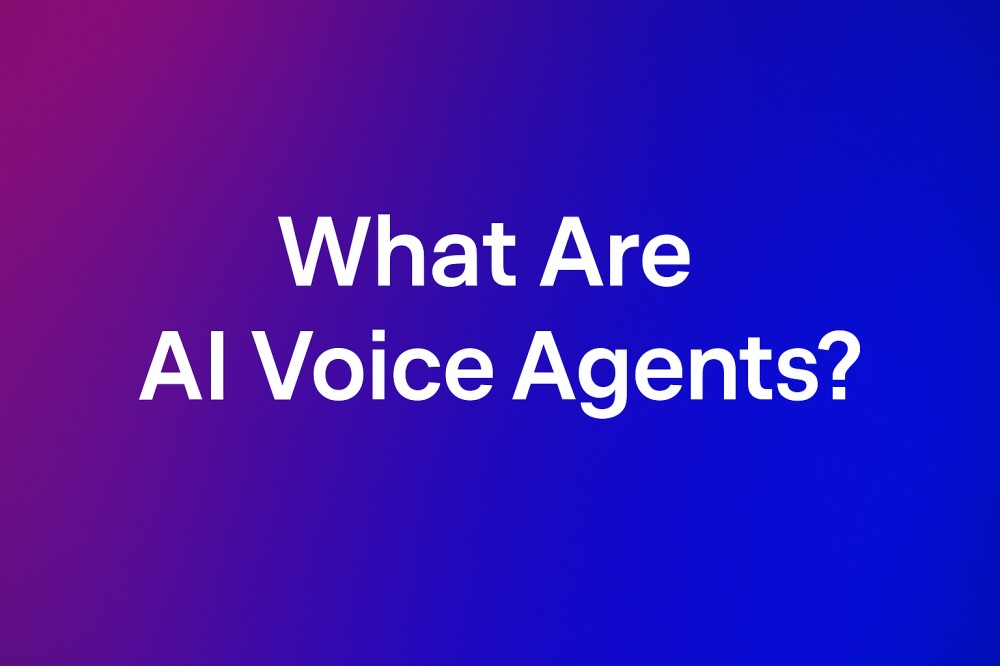AI voice agents are transforming the way people and businesses communicate. By using advanced technologies like speech recognition, natural language processing, and voice synthesis, these agents can understand spoken language and respond just like a human would. From customer service to virtual assistants, AI voice agents are now being adopted across industries to improve efficiency, reduce costs, and offer seamless user experiences. In this article, we’ll explore what AI voice agents are, how they work, their key benefits, and how you can create your own AI voice agent with ZEGOCLOUD.
What are AI Voice Agents?
AI voice agents are software programs that use artificial intelligence to simulate human-like conversations through voice. These agents can perform tasks like customer support, appointment scheduling, or real-time translation, often using natural language processing (NLP), speech recognition, and voice synthesis technologies.
From smart speakers to enterprise applications, AI voice agents are now being widely used in industries like e-commerce, healthcare, finance, and education.
How AI Voice Agents Work
AI voice agents operate through a seamless chain of intelligent processes that allow them to understand and respond to spoken language in real time. It all begins when a user speaks into a device, such as a smartphone or smart speaker. The agent captures this voice input and uses automatic speech recognition (ASR) to convert the spoken words into text.
Once the text is generated, the system applies natural language understanding (NLU) to interpret the meaning behind the words. This step helps the AI determine the user’s intent and extract relevant context from the conversation. Based on that understanding, the voice agent processes the information and decides how to respond.
Next, the response is generated and passed through a text-to-speech (TTS) engine, which converts the written reply into a natural-sounding voice. Finally, the audio response is delivered back to the user instantly, completing the interaction loop.
Advanced platforms like ZEGOCLOUD take this entire process to the next level by offering ultra-low latency and the ability to support conversations involving multiple AI agents at once, creating more dynamic and human-like communication experiences.
Benefits of AI Voice Agents
Implementing AI voice agents can significantly enhance both customer experience and business efficiency:
- 24/7 Availability – Operates round the clock without breaks.
- Cost Efficiency – Reduces staffing costs while scaling operations.
- Faster Response Time – Handles thousands of requests simultaneously.
- Multilingual Support – Many voice agents can serve users in different languages.
- Consistent Experience – Provides standard answers and behavior across all users.
These agents are becoming indispensable for businesses looking to automate and personalize their customer journeys.
10 Best AI Voice Agents in 2025
As AI voice agents continue to evolve, a growing number of platforms are offering solutions tailored to different use cases, ranging from developer tools to enterprise-grade services. Here are the 10 best AI voice agents in 2025, each with an overview, pros, cons, and pricing insight.
1. ZEGOCLOUD AI Agent
ZEGOCLOUD AI Agent is a real-time communication SDK that allows developers to integrate intelligent voice agents into their apps with ultra-low latency. It supports multi-agent group conversations, voice cloning, and customizable personas, making it ideal for virtual companions, customer service, education, and smart devices. It also connects seamlessly with large language models like ChatGPT, Claude, and others.
Pros:
- Ultra-low latency (<200ms)
- Multi-agent group conversation support
- Flexible integration with popular LLMs like ChatGPT
- Cross-platform SDKs (web, mobile, embedded)
Cons:
- Currently supports only English
2. Google Dialogflow
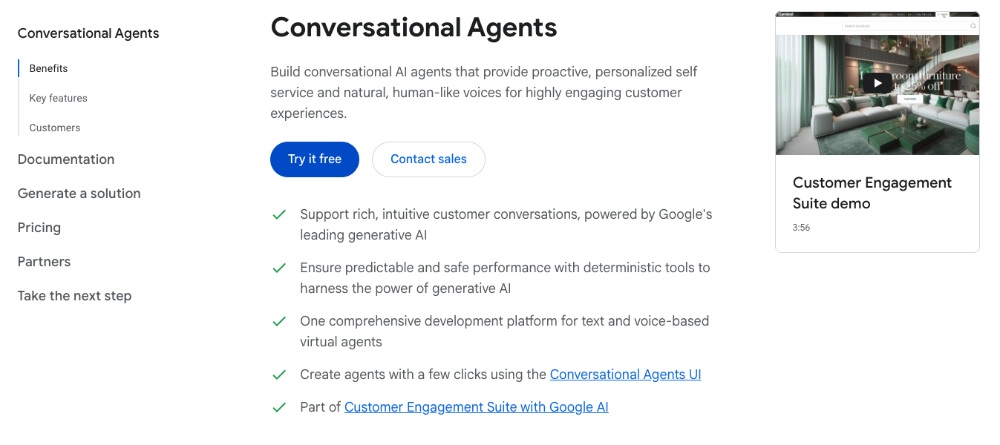
Google Dialogflow is a natural language understanding platform for building conversational applications, including voice bots. It can be connected with Google Cloud Speech-to-Text and Text-to-Speech APIs to enable voice input and output. It’s widely used for customer service automation, virtual agents, and smart devices that integrate with Google Assistant.
Pros:
- Backed by Google’s AI
- Strong NLP capabilities
- Easy integration with Google ecosystem
Cons:
- May require engineering support for full voice integration
3. Amazon Lex
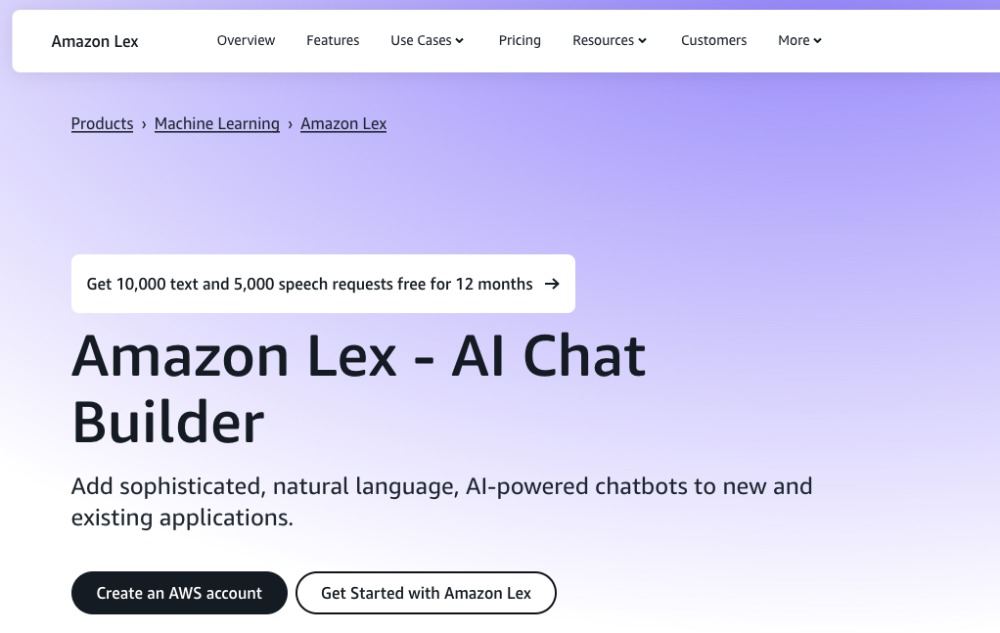
Built with the same deep learning technologies as Alexa, Amazon Lex enables you to create voice-powered applications with automatic speech recognition (ASR) and natural language understanding. It’s tightly integrated with other AWS services, making it easy to connect your voice bots to backend logic, databases, and analytics tools.
Pros:
- Seamless AWS integration
- Strong speech and language understanding
- Secure and scalable
Cons:
- More suitable for AWS users
- Limited UI design flexibility
4. Microsoft Azure Bot Service

Azure Bot Service offers an end-to-end framework for developing enterprise-grade bots that can interact with users via voice. By integrating with Azure Cognitive Services, developers can add speech capabilities, sentiment analysis, and language translation, making it a robust solution for customer engagement and enterprise automation.
Pros:
- Integration with Azure ecosystem
- Advanced AI capabilities
- Custom voice support with Azure Cognitive Services
Cons:
- Steeper learning curve for beginners
5. IBM Watson Assistant
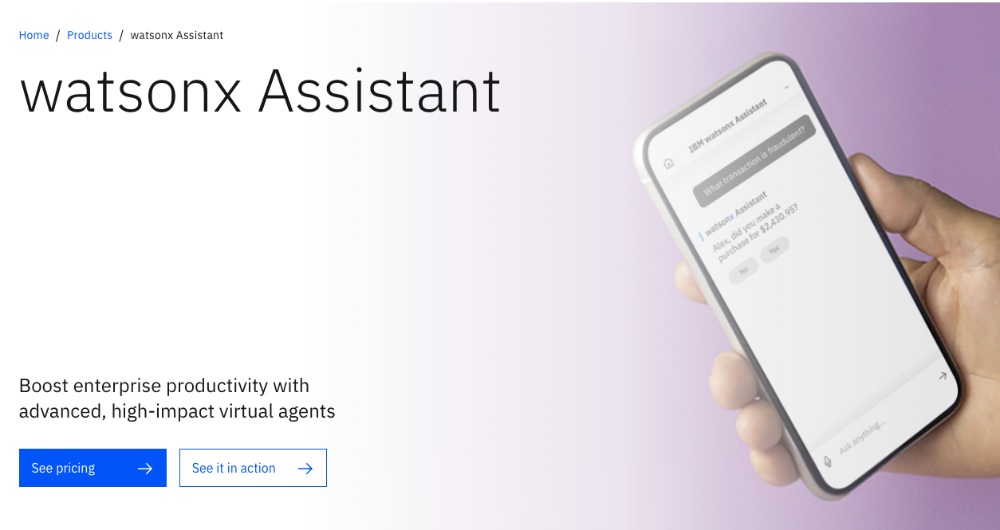
IBM Watson Assistant is a conversational AI platform designed for businesses looking to build advanced virtual assistants with voice capability. It can be connected to Watson Speech-to-Text and Text-to-Speech services, and offers pre-built skills, data privacy controls, and deep analytics, suitable for industries like finance, healthcare, and telecom.
Pros:
- Enterprise-level customization
- Pre-trained industry models
- Supports voice and chatbot experiences
Cons:
- Higher cost for smaller businesses
6. OpenAI Whisper + ChatGPT API

OpenAI Whisper is an open-source speech recognition model that can transcribe audio with high accuracy. When combined with ChatGPT API, developers can build intelligent voice agents capable of understanding complex language and generating conversational replies. This combination is ideal for creating highly flexible, custom voice AI experiences.
Pros:
- Cutting-edge voice and language models
- Full customization control
- Fast improvement cycles
Cons:
- Requires coding and system design expertise
7. SoundHound Voice AI
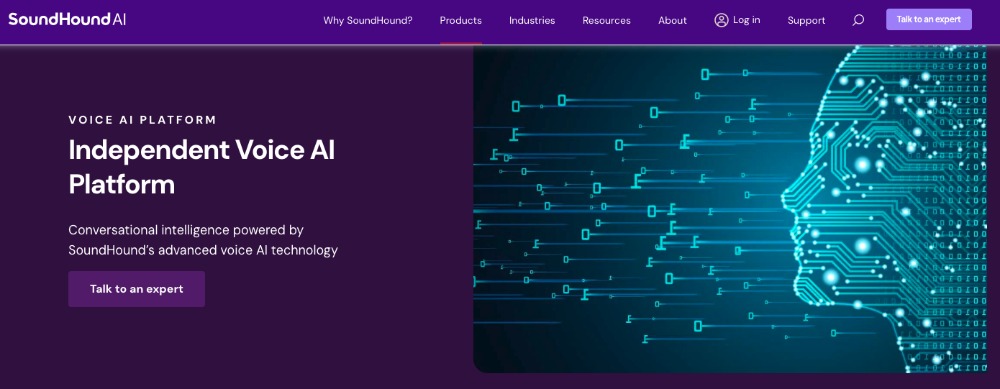
SoundHound provides an independent voice AI platform optimized for real-time, conversational interaction. It supports wake word detection, command processing, and natural dialogue. Often used in automotive, smart home, and restaurant systems, it delivers fast, on-device and cloud-based responses, with options for domain-specific training.
Pros:
- Instant responses
- Offline capabilities
- Context-aware conversation flow
Cons:
- Not as general-purpose as other tools
8. Speechly
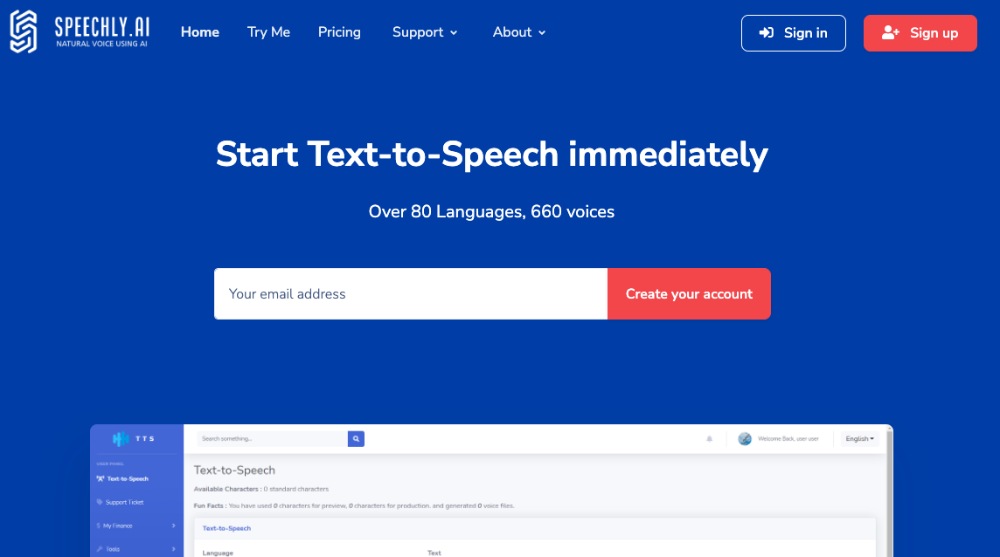
Speechly is a voice interface API designed for real-time streaming speech recognition and intent detection. It allows developers to build voice-enabled web and mobile apps with a focus on smooth user experiences. Unlike traditional voice platforms, Speechly processes speech while the user is still speaking, improving responsiveness.
Pros:
- Real-time ASR and NLU
- Designed for voice-enabled apps and devices
- Developer-friendly SDKs
Cons:
- Smaller community and ecosystem
Pricing:
Contact for pricing details.
9. Kore.ai SmartAssist
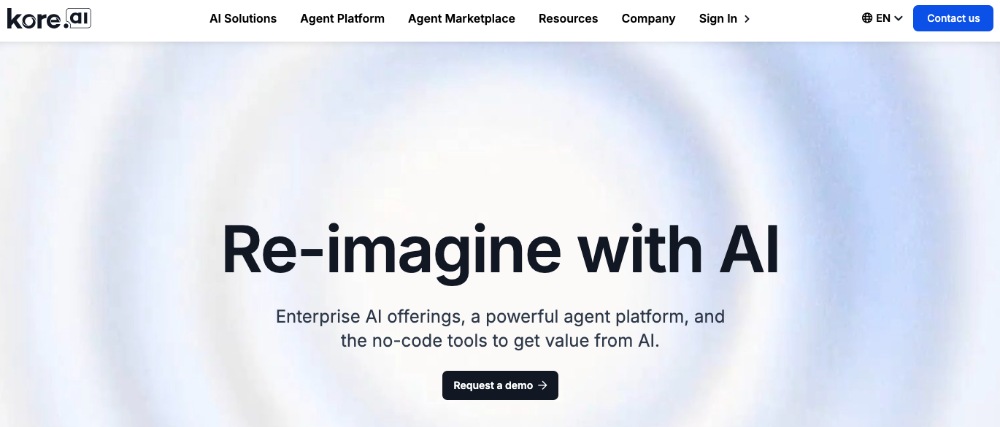
Kore.ai’s SmartAssist platform is built for enterprise use, providing virtual assistants and voice bots that support customer support, IT helpdesk, and HR use cases. It features no-code/low-code design tools, workflow automation, voice input/output, and analytics dashboards, making it ideal for scaling AI support operations across departments.
Pros:
- Multi-channel voice bot capabilities
- Enterprise security and analytics
- Integration with CRM and support tools
Cons:
- Complex for small-scale use cases
10. Teneo by Artificial Solutions
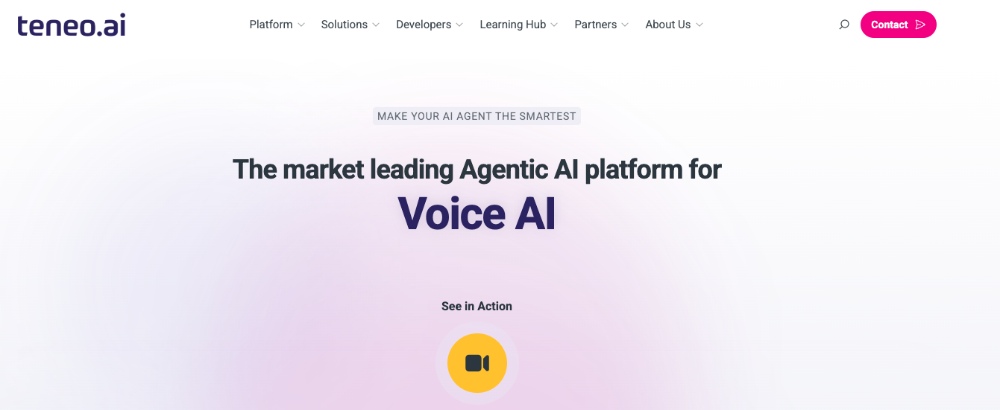
Teneo is an advanced conversational AI platform designed for building multilingual, voice-enabled virtual assistants that can operate across platforms and devices. It supports rich dialogue flow, context memory, and emotion detection, making it especially powerful for enterprises that require a deep, personalized user experience in voice-based interactions.
Pros:
- Natural, human-like dialogue handling
- Multilingual and omnichannel support
- High configurability
Cons:
- Expensive and requires expert setup
How ZEGOCLOUD Helps You Build Custom AI Voice Agents
If you’re looking to build a real-time, low-latency AI voice agent that integrates with your app or business system, ZEGOCLOUD provides everything you need.
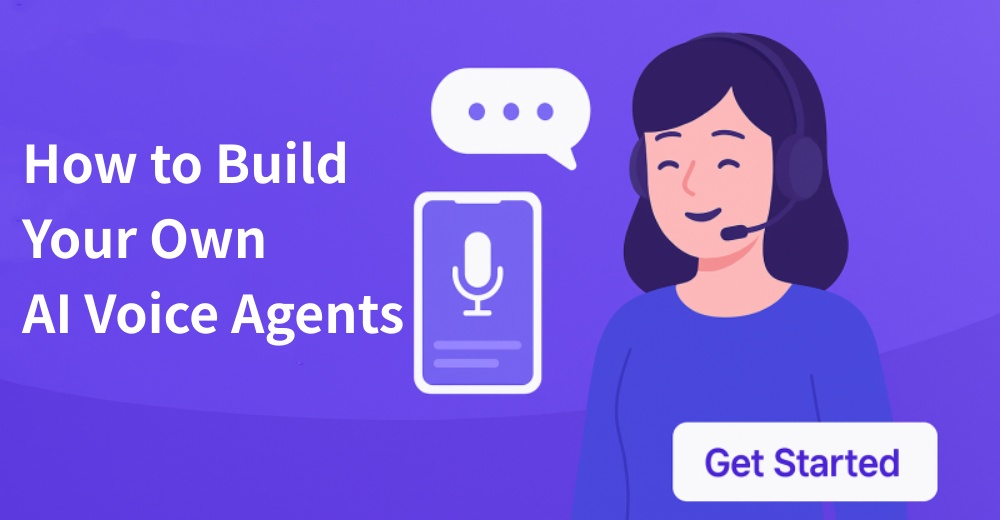
ZEGOCLOUD offers a robust AI Agent SDK that allows you to deploy fully customizable AI voice agents, including:
- Real-Time Audio Conversations: Ultra-low latency (<200ms) for natural interactions.
- Multi-Agent Support: Enable group conversations with multiple AI characters.
- TTS + ASR Integration: Built-in speech synthesis and recognition.
- Cross-Platform SDKs: Compatible with Android, iOS, web, and more.
- Custom Persona Control: Tailor the agent’s tone, voice, and behavior.
- Multi-LLM Flexibility: Integrate with ChatGPT, Claude, Minimax, or your own LLM.
With ZEGOCLOUD, developers can build next-gen voice AI solutions for virtual companions, customer support, online education, or smart hardware without building everything from scratch.
Conclusion
AI voice agents are transforming the way we interact with technology, offering faster, smarter, and more personalized communication experiences. As more businesses adopt voice-driven solutions, choosing the right platform becomes critical to success. Whether you’re building a virtual assistant, enhancing customer support, or developing a voice-enabled product, the tools are now more powerful and accessible than ever.
With ZEGOCLOUD’s flexible SDKs and real-time capabilities, developers can create fully customized AI voice agents that meet modern demands—without the heavy technical burden. If you’re ready to bring intelligent voice interaction into your app or platform, ZEGOCLOUD provides the infrastructure to make it happen.
FAQ
Q1: What is the difference between a voice bot and an AI voice agent?
A voice bot typically follows pre-defined scripts or command sets, while an AI voice agent uses AI models like NLP and machine learning to understand intent, hold conversations, and respond naturally in real time.
Q2: Can I integrate AI voice agents into mobile apps (iOS/Android)?
Yes, many platforms including ZEGOCLOUD, Google Dialogflow, and Amazon Lex offer SDKs or APIs that support mobile app integration across Android and iOS.
Q3: Do AI voice agents work offline?
Most AI voice agents rely on cloud-based processing for speech recognition and AI reasoning. However, some platforms like SoundHound or custom-built agents can provide limited offline functionality with preloaded data.
Let’s Build APP Together
Start building with real-time video, voice & chat SDK for apps today!









